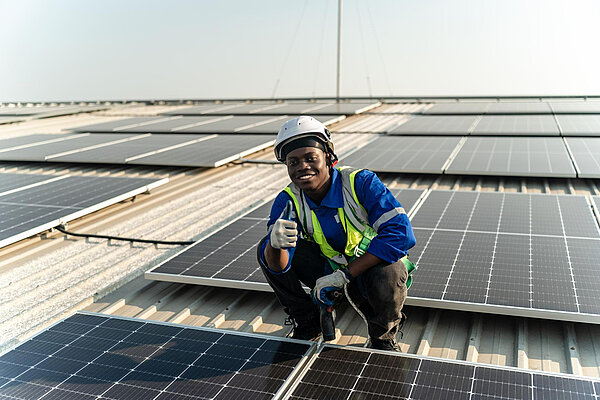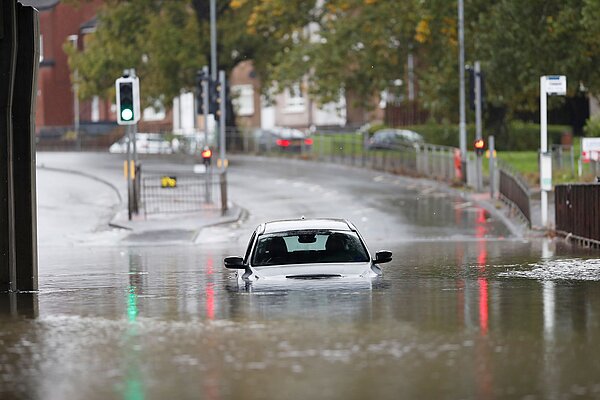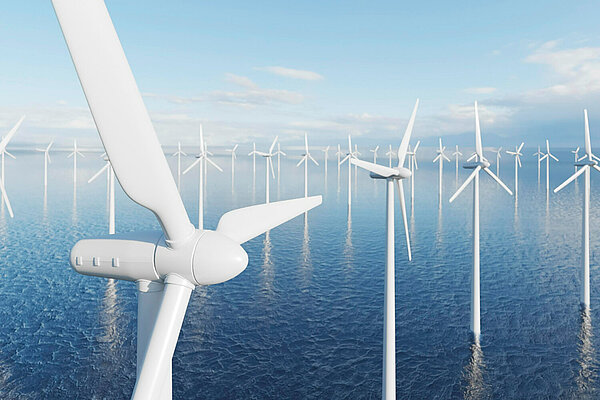For People, For Planet
Liberal Democrat proposals for Climate Policy
Policy Paper 160
The climate and nature emergencies pose both a serious threat and a significant opportunity for Britain’s future. Liberal Democrats want this generation to be the first to leave the UK, and the world, in a better condition than we found it. Our approach is based on three key themes:
- Putting people first: the measures needed to address these challenges must be equitable, fair and affordable, developed with people rather than imposed on them, and ensuring that no communities or workers are unfairly affected or left behind.
- Tackling the climate and nature emergencies equally, rather than pitting one against the other, through integrating climate, nature and resilience policies.
- Leading on the world stage: mobilising international cooperation, especially with the EU, to tackle these global challenges.

Putting people first
The focus of Liberal Democrat climate change policy is to deliver tangible, positive outcomes for individuals and their communities, building a future where we live in harmony with our planet. It is vitally important that climate action has the full support of the public, that they are fully involved in its development, and that their concerns – over local impacts, the cost of living and economic security – are fully addressed. We would:
- Protect people from future energy shocks by investing in renewable energy and reducing Britain’s dependence on fossil fuels, including banning onshore production.
- Address the cost-of-living crisis and accelerate decarbonisation of heating and transport by lowering electricity costs and offering support to all households through improved grants and stamp duty rebates.
- Assist low-income households by introducing a social electricity tariff and providing targeted free home energy improvements.
- Ensure the provision of comprehensive advice and assistance to homeowners through local one-stop-shop sources of advice on all potential improvements, including insulation, heat pumps, solar panels, batteries, EV charging points and adaptation measures.
- Ensure that no communities are left behind, including by creating a Just Transition Commission to develop just transition plans and provide funding support for vulnerable communities, especially those reliant on declining fossil fuel industries.
- Make sure that policies are developed and deployed in partnership with those they aff ect, including citizen input through a National Climate Assembly, and local engagement – building trust, legitimacy, and resilience against future political reversal; improve communication about the challenges and opportunities of the transition, and counter misinformation.

Making climate, nature and resilience policy a priority
Liberal Democrats support the UK’s existing net-zero framework and 2050 target. There is no point, however, in limiting emissions from UK production only to see them replaced by imports, so we would also limit consumption emissions in key sectors.
We would reform the machinery of government to create a clear voice and leadership on climate, nature and resilience policy, including appointing a cabinet-level Chief Secretary for Sustainability in the Treasury, and drawing up a Climate, Nature and Resilience Roadmap to set specific objectives that departments must meet and be accountable for.
We would decentralise powers and resources to local councils – which are much closer to communities than central government – to enable them to lead on retrofitting homes, investing in renewable energy and sustainable transport and fostering community-led climate initiatives. This would include a statutory duty to develop Climate, Nature and Resilience strategies, both for their own council’s activities and procurement and for the area they cover.
We believe that the UK must help lead the global efforts needed to tackle climate change. We would build a much stronger relationship with the EU, organise international coalitions of the willing to work on both global goals and targeted activities, use trade policy to prioritise low-carbon goods, and increase development assistance for climate action. With its world-leading research facilities, the UK has a major role to play in developing technologies that can reduce the costs and challenges of decarbonisation globally.

Stimulating green investment and prosperity
The transition to a zero-carbon, and nature- and climate-resilient economy offers major benefits to the UK economy. The net-zero sector is currently growing three times faster than the overall UK economy, expanding by 10 per cent in 2024; it employs almost a million people in full-time jobs that pay on average almost 15 per cent more than the national average.
We would place decarbonisation at the heart of the UK’s industrial strategy, unlocking large-scale private investment by maintaining stability in government policy and mitigating the perceived risks of investment in zero-carbon activities.
We would accelerate investment in the transition to a zero-carbon and climate-resilient Britain, ensuring that the National Wealth Fund delivers on its net-zero mission at scale and at pace, accepting more risk to crowd in private finance and opening its expertise to local authorities; enhancing the UK’s green bond standards to ensure investment flows into key net-zero sectors; and reforming public procurement rules to prioritise climate goals.
We would make sure major emitters of greenhouse gas pay, by ensuring the rapid implementation of the current government’s proposals to link the UK Emissions Trading Scheme (ETS) with the EU ETS, together with introducing a UK Carbon Border Adjustment Mechanism to protect UK industry against companies based in other countries which do not face similar carbon pricing costs.
We would implement a comprehensive zero-carbon skills strategy to support reskilling, retraining, and green apprenticeships, ensuring school-leavers and workers can move into sustainable industries and meet the demands of a changing economy.

Adapting to the impacts of climate change
Successive governments have comprehensively failed to take climate adaptation measures seriously, guaranteeing misery for people and communities affected by flooding, wildfires and heat stress. We would:
- Prioritise protecting communities by implementing a comprehensive UK adaptation strategy, embedding climate resilience into decision-making across all government departments and agencies to prevent problems before they happen.
- Deliver adequate funding to local communities to combat flooding, drought and heatwaves, including nature-based flood management, sustainable drainage, water supply enhancements, building retrofits and urban greening, backed by stronger planning and regulatory frameworks.
- Develop resilience standards for the energy, water, transport and telecommunications sectors; and support homeowners to install proactive adaptation measures against flooding and overheating.

Decarbonising energy
Decarbonising energy use in power generation, heating, transport and industry will not only reduce emissions but help to deliver energy security and stimulate investment, jobs and prosperity. We would:
- Achieve 95 per cent decarbonisation of power by 2030, and support further growth to enable electricity to replace fossil fuel use in other sectors.
- Support the roll-out of small modular nuclear reactors if they can provide a cost-effective and safe part of a decarbonised generation mix.
- Expand grid capacity, and support local communities affected by major new energy infrastructure by requiring electricity suppliers to make Community Benefit commitments, and by investing £1 billion to bury cables in sensitive areas.
- Support community energy in delivering net zero, building local support for climate action and sharing the economic benefits.
- Support major home insulation upgrades, the widespread deployment of heat pumps and similar technologies, and ban new gas boiler sales by 2035.
- Introduce zero-carbon and climate-resilience standards for new builds; ensure that all buildings meet a minimum energy performance standard within 15 years; and raise the cap on the cost of the improvements private landlords are required to undertake to raise their properties to minimum levels of energy performance.
- Accelerate the transition to electric vehicles (EVs) by expanding charging infrastructure (including mandatory targets and grid upgrades), ensuring fair access to charging, supporting zero-emissions vehicles sales mandates and reforming planning rules.
- Promote walking and cycling and focus new developments around sustainable transport corridors, by empowering local authorities with new funding and planning powers.
- Improve public transport by developing a ten-year rail electrification plan, incorporating climate resilience standards, and supporting zero-emission buses and rural transit alternatives.
- Support innovation, research and development in zero-carbon flight; but unless progress is more rapid than projected, reduce emissions by reforming air passenger duty for international flights to target the most frequent flyers, and limiting airport expansion.
- Expand incentives for electrification and carbon capture in industry, encourage energy and resource efficiency (including circular economy practices), and provide support and incentives to business.
- Support a just transition as North Sea oil and gas production declines, with strong support for workers and communities, reorienting infrastructure and skills towards renewables, carbon capture and storage and decommissioning. We would reduce emissions from extraction.

Supporting sustainable food and farming
We would ensure the agriculture, land use and forestry sector becomes a collective net carbon sink by 2050, through:
- Properly funding the Environmental Land Management Schemes (ELMS), with an extra £1 billion a year to support profitable, sustainable and nature-friendly farming, resilient to the impacts of climate change.
- Support research and innovation with a new Farming and Land Use Catapult innovation centre, and a new Food and Farming Research and Innovation fund to help develop the UK into a world leader in emerging new technologies, including precision farming and alternative proteins, which have the potential to create new jobs, reduce dependence on imports and improve diets.
- Take steps to reduce food waste, and require public sector food and catering to meet high sustainability standards and make greater use of locally produced and seasonal food.
Taking carbon out of the atmosphere
Since it will be impossible to eliminate emissions from some sectors by 2050 or even later, means must be found to remove carbon dioxide from the atmosphere. We would give top priority to nature-based solutions for carbon removal, including expanding forests and restoring peatlands. We would pursue international collaboration on research and innovation for new technologies such as direct air capture and carbon storage (DACCS).